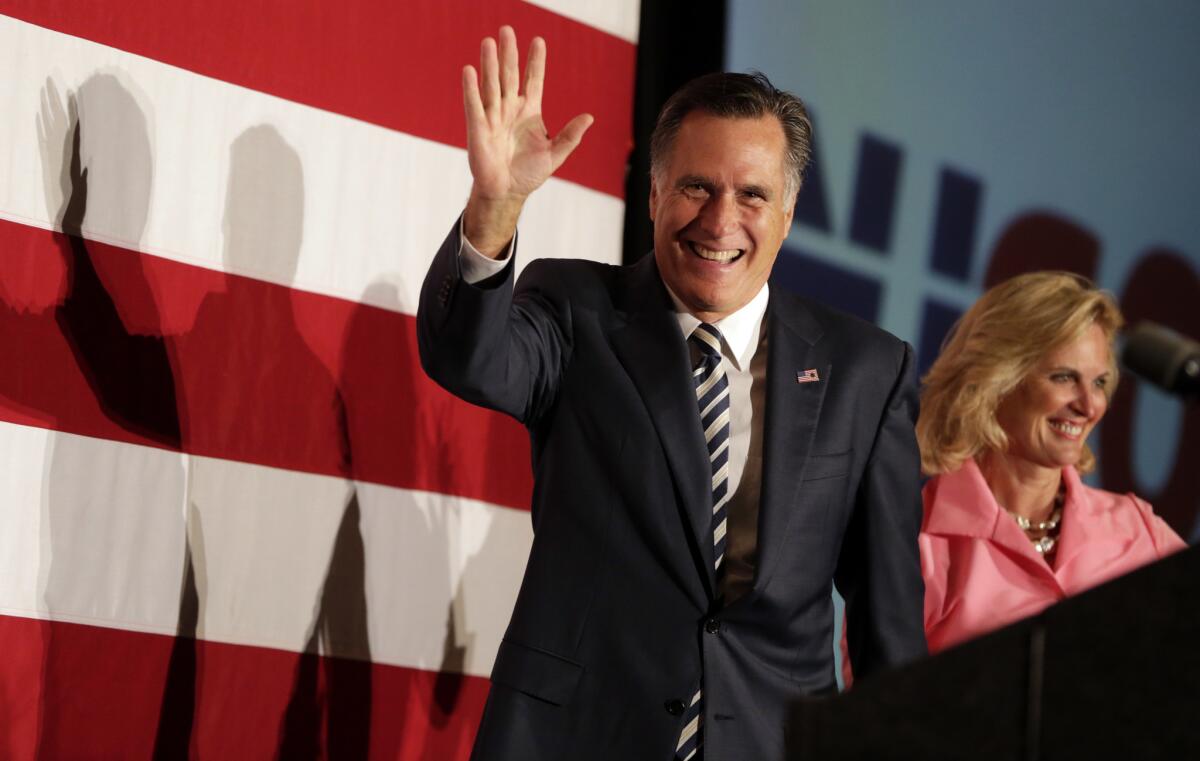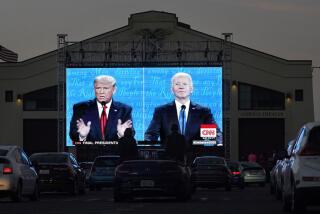Keeping options open, Mitt Romney alters reality on 47% remark

Would-be presidential candidates often keep their options open in defiance of reality, which perhaps explains why Mitt Romney, who has twice lost presidential bids, has been making a few hints that he may not be done seeking the White House.
But in an interview released Tuesday by the New York Times, he also defied reality in his depiction of one of the defining moments of his 2012 campaign, when he won the Republican nomination but lost the election to President Obama.
Romney told writer Mark Leibovich that his controversial statement that 47% of the population was dependent on government aid and thus in Obama’s pocket “was an attempt to placate a rambling supporter who was saying that Obama voters were essentially deadbeats,” as the story put it.
“My mistake was that I was speaking in a way that reflected back to the man,” Romney told Leibovich. “If I had been able to see the camera, I would have remembered that I was talking to the whole world, not just the man.”
But that’s not what happened.
The questioner at the private fundraiser in 2012 asked a simple question, according to Mother Jones, which first published the video:
“For the last three years, all everybody’s been told is, ‘Don’t worry, we’ll take care of you.’ How are you going to do it, in two months before the elections, to convince everybody you’ve got to take care of yourself?”
It was Romney who energetically, and at length, knocked those receiving government aid:
“There are 47% of the people who will vote for the president no matter what. All right, there are 47% percent who are with him, who are dependent upon government, who believe that they are victims, who believe that government has a responsibility to care for them, who believe that they are entitled [Romney emphasized the word] to healthcare, to food, to housing, to you name it. That that’s an entitlement. And the government should give it to them. And they will vote for this president no matter what. And I mean, the president starts off with 48, 49, 48 — he starts off with a huge number.
“These are people who pay no income tax. Forty-seven percent of Americans pay no income tax. So our message of low taxes doesn’t connect. And he’ll be out there talking about tax cuts for the rich. I mean that’s what they sell every four years. And so my job is not to worry about those people. I’ll never convince them that they should take personal responsibility and care for their lives.”
Notably, when the video surfaced less than two months before the election, Romney did not disavow the sentiments, as the Los Angeles Times reported.
“It’s not elegantly stated, let me put it that way,” he said the day it was released. “It’s a message which I’m going to carry and continue to carry, which is, look, the president’s approach is attractive to people who are not paying taxes because, frankly, my discussion about lowering taxes isn’t as attractive to them, and therefore I’m not likely to draw them into my campaign as effectively as those who are in the middle.”
Indeed, Romney said much the same in a postelection phone call with his donors that a Times reporter listened in on.
Romney asserted then that he lost because Obama had given “gifts” to voters, specifically citing the young, African Americans and Latinos, all of them among Obama’s most loyal supporters.
“The Obama campaign was following the old playbook of giving a lot of stuff to groups that they hoped they could get to vote for them and be motivated to go out to the polls, specifically the African American community, the Hispanic community and young people,” Romney told the donors. “In each case they were very generous in what they gave to those groups.”
He specifically cited Obama’s healthcare plan as attractive to Latinos and African Americans, two groups that had also propelled his 2008 victory, before there was a healthcare plan.
Obama also won several states where those voter groups were not decisive, and in part by casting Romney as the candidate who wanted to give away government largess, in the form of tax breaks that were heavily skewed to the benefit of the wealthy.
But his loss in 2012, and his primary loss to nominee John McCain in 2008, has apparently not dissuaded Romney from at least keeping all avenues open for 2016, a prospect which seems most acutely desired among his loyal donors, as opposed to Republicans overall.
“We’ve got a lot of people looking at the race,” he said when asked by the New York Times if there was a chance he was running. “We’ll see what happens.”
For political news and analysis, follow @cathleendecker on Twitter
More to Read
Get the L.A. Times Politics newsletter
Deeply reported insights into legislation, politics and policy from Sacramento, Washington and beyond. In your inbox three times per week.
You may occasionally receive promotional content from the Los Angeles Times.











